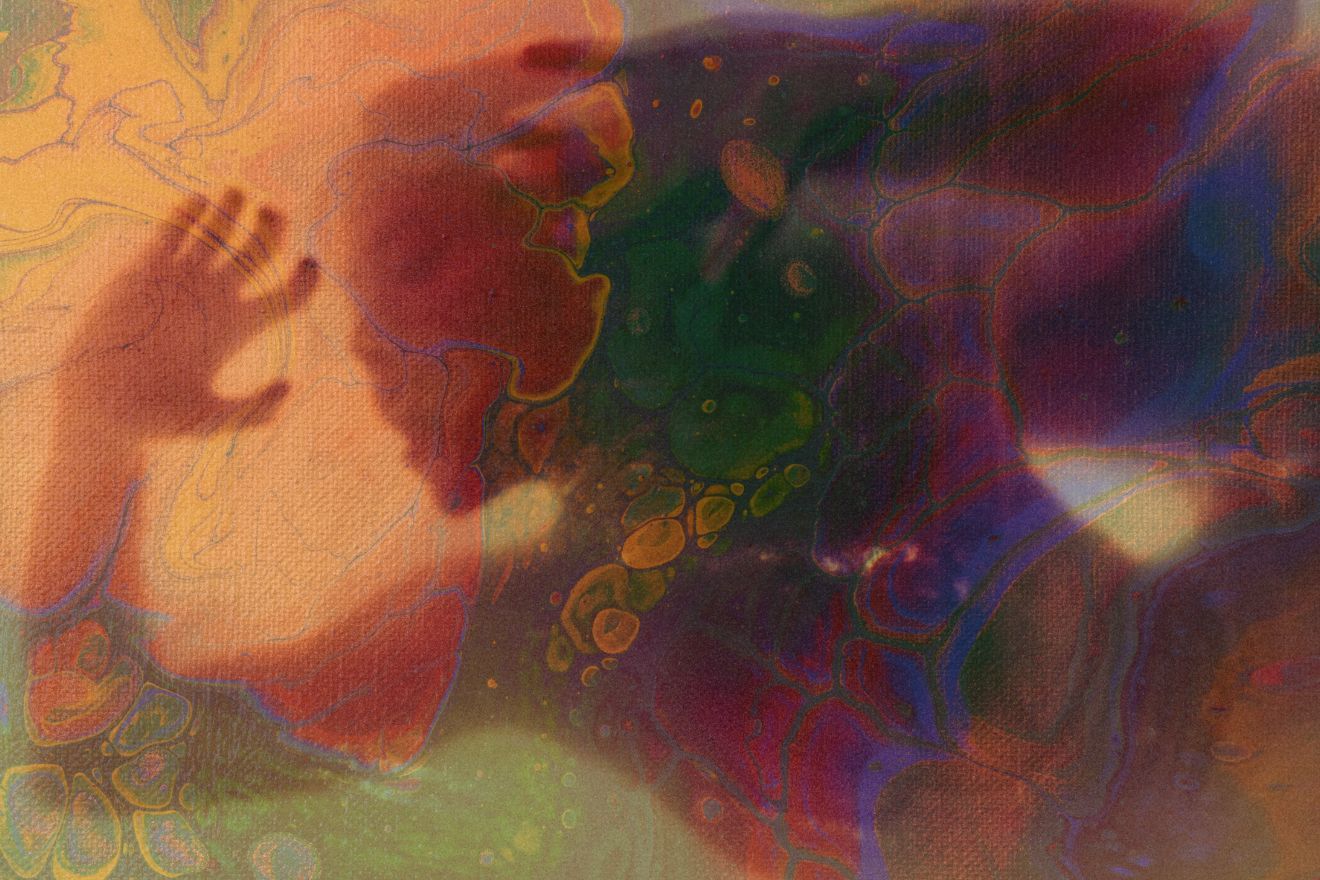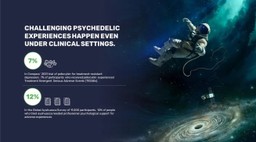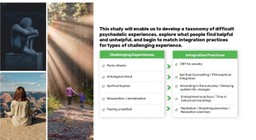At Psychedelic Support, we know psychedelic experiences are not always unicorns and pixie dust. In fact, psychedelic journeys oftentimes bring up trauma, difficult emotions, and anxiety. We offer connection to therapists and community groups to support the integration of challenging experiences. But we still don’t have a firm understanding of how often challenging experiences occur or how to best navigate them when they do arise. That’s why we are helping to bring awareness to the Challenging Psychedelic Experiences survey – the first empirical study project on how people experience and recover from difficult trips.
There are a few ways to get involved with this important work, listed at the end of the article.
The first step is this online survey. If you’ve had a difficult psychedelic experience, where the difficulties (cognitive, emotional, interpersonal, spiritual, etc.) lasted for longer than a day, and you’d be willing to share your experience anonymously to help others, please take 15 minutes to fill in the survey.
Psychedelics offer an incredible alternative to failing mental health treatments. But every medicine has its risks.
This is, as far as we know, the first empirical study of what helps people who have difficult psychedelic experiences. There have been medical reports of people being hospitalized after bad trips, but nothing where people themselves have actually been asked about their experiences and what helped them.
Why does this topic matter to me, out of all the pressing issues facing humanity?
I don’t think it’s the supreme issue of our time, of course, but no one else is working on it (despite the field of psychedelic research being quite crowded now), and it matters to me for personal reasons.
My ‘Bad Trip’
When I was 18, I had a difficult psychedelic experience, or ‘bad trip’ as they used to be called – though I don’t like that phrase, because, as Hamlet put it, ‘there’s nothing either good or bad, but thinking makes it so’.
I had been doing too many drugs in my last year at school and was becoming increasingly strung out.
Then, in the autumn, after I left school, I went to a rave and dropped LSD (I think it was LSD). I had a rather edgy, ungrounded experience at the rave. I then went back to a friend’s house for an after-party. I didn’t know the people I was with very well. I felt increasingly self-conscious and paranoid. I didn’t say anything, and that made me feel more self-conscious, and I got into a doom loop of social anxiety.
I didn’t just get up and leave, because in my mind I couldn’t go back to my parents’ flat until I’d come down from the trip. So I was stuck there, afraid and silent, and certain in my mind that everyone in the room was aware of my discomfort and the rank smell of fear I thought must be emanating from me.
I finally got up to lie down in a bedroom in my friend’s apartment. I remember I had to really summon up my courage to say, ‘I’m going to lie down next door’ – that’s how distorted things can get on psychedelics. I lay down in the bedroom and was sure I could hear the other people at the after-party dissecting my character.
I lay there, my mind burning. At 5 a.m., I crept out of the house, walked home through the grey streets of West London, and quietly let myself into my parents’ apartment.
I was back home, but home now felt like a dangerous and alien place – because I didn’t want my parents to know I’d taken drugs and was having a bad experience.
I was a young man in deep distress, and yet I felt alienated from my own home and family, unable to tell my parents, or anyone else for that matter. I hope that never happens to anyone else.
I lay in bed, and one thought burned through my brain. ‘You’ve blown it now. You’re damaged goods.’
It’s a funny phrase: damaged goods. Implying I was some sort of commodity.
I finally fell asleep, and the next day I wasn’t tripping anymore. But the experience left a bruise that didn’t heal.
Follow your Curiosity
Sign up to receive our free psychedelic courses, 45 page eBook, and special offers delivered to your inbox.I didn’t tell anyone about it. Why not? I was a very different person to who I am today and the experience just didn’t fit with my social persona. I felt ashamed of it, ashamed of my weakness. And my best friends were abroad at the time.
Besides, what was the point of telling people? I didn’t have a clue that talking about it would be helpful.
The bruise spread and affected every social interaction I had. There was now an underlying anxiety beneath my social persona, a nagging fear: ‘Are you the same person? Have you damaged yourself?’
My identity was very geared to social performance and status, so I checked to see if I was OK by scrutinizing other people’s reactions—was I as funny and charming as I was before? I was living life through a mirror rather than addressing my own inner pain.
Life became a game of hide and seek, me trying to hide my pain, becoming increasingly paranoid that others would detect it.
And if others reacted to me negatively because I seemed uptight, it confirmed my deep fear: ‘You’re not who you were. You’re damaged goods. You’ve fried your brain.’
Developing Social Anxiety at University
At university, my fears slowly developed into post-traumatic stress disorder and social anxiety. The panic attacks, nightmares, and social anxiety became sufficiently bad that I finally told my parents I was unwell, and they sent me to a psychiatrist, a friend of theirs from Cambridge.
He told me I was suffering from classic adolescent anxiety and to deal with it. I think the problem was I was so good at maintaining a façade that no one could tell how unwell I was.
As John Le Carre has said: ‘An Englishman can be having a full scale nervous breakdown right next to you, and he is so good at hiding his emotions you can be standing next to him and be none the wiser. This is why they make good spies.’
I graduated from Oxford (with a first, by the way – my social capacities were atrophying, but my intellect was intact, so I increasingly took refuge in the safer world of books). After finals, I had a mini-breakdown. My parents sent me to another psychiatrist.
The Experiences That Helped Me Heal
He diagnosed me with PTSD and said he could heal me in two sessions of EMDR (a fringe therapy where you think about the traumatic event while moving your eyes left and right) and tapping (another fringe therapy). It seemed to work for a few weeks – I felt free of the cage of PTSD. And then I had another panic attack.
Finally, when I was 24 or so, things got better. As I’ve discussed before, I had a near-death experience, which gave me the information that what was messing me up was not my fried brain but my own beliefs.
It was the belief ‘you have permanently screwed yourself up’ that was screwing me up. The near-death experience enabled me to let go of that belief and trust in my soul.
By the way, last month, I met Nir Tadmor, an Israeli psychologist who works on psychedelic harm reduction – he’s on the supervisory board of this research project. He told me that people who get into long-term difficulties after ‘bad trips’ often believe ‘I have permanently damaged my brain’. This belief becomes like a millstone, dragging them down.
After my lucky NDE, I turned to Stoicism and Cognitive Therapy, which helped me change my beliefs and become a healthier person very slowly. It took me years.
So from the initial ‘bad trip’ (or difficult psychedelic experience), it took me six years or so of desperately trying to work out what was wrong with me until I gradually came out of that decline.
I had to figure out how the mind and emotions work for myself. I don’t want other young people to have to go through that experience. That is why I am involved with this research project, why I also worked to promote Stoicism, why I do what I do,
Because I know how hellish it is to be stuck in negative mental states. And I know how precious it is to be healed from those mental states.
Support Systems are Few and Far Between
My initial ‘difficult psychedelic experience’ was in 1995. 27 years on, the field has progressed somewhat.
Today, there are several organizations that support people having difficult psychedelic experiences at festivals, like PsyCare or Zendo Project. There is the Fireside Project – a support service you can phone if you’re having a difficult trip. There are a few papers published on difficult psychedelic experiences and what they’re like. And there are integration therapists and support groups, including some like Marc Aixala in the Psychedelic Support Network, who has been working for years to support clients who get into difficulties after a ‘bad trip’.
There isn’t, yet, any study that asks the people themselves what difficulties they encountered after their trip and what helped them deal with those difficulties.
I think that’s a good way to approach the problem – you can call it ‘patient-led’ or ‘lived experience’. I’ve been into that sort of crowd-sourced, patient-led approach ever since I recovered from social anxiety through a CBT support group. That’s one of the reasons I’m a fan of Stoicism – it is a form of patient-led psychotherapy that empowers individuals rather than giving all the power to the therapist or psychiatrist.
It’s also the approach I took to spiritual emergencies when I co-edited Breaking Open with Tim Read. We asked people who had been through a ‘spiritual emergency’ to describe it and tell us what helped them overcome it.
No one knows better what helps them recover from a mental illness than the person themselves.
Hopefully, the outcome of this study will be that we get a better sense of the sorts of difficulties people can get into after a challenging psychedelic experience and a sense of the sorts of interventions that help people. We might begin to match particular difficulties to particular interventions. We can share this information and some of the stories we encounter online.
So that if there’s someone out there who’s really struggling, like I was, and they don’t know where to turn, there is information there, they know they’re not alone, that other people have also gone to these far-out places, and they have come home safely.
If you want to support our project, you can do so in the following ways:
1) Fill in the survey if you fit the criteria (i.e., you also had a psychedelic experience that led to difficulties or challenges lasting longer than a day)
2) Share the survey. We want to share it as widely as possible. If you want to post a link, post this one: https://bit.ly/challengingpsychedelicsurvey
With this text:
A team of British psychologists is researching difficult psychedelic experiences and what helps people cope with them. If you’ve had a psychedelic experience that led to difficulties lasting beyond the trip itself, please take 15 minutes to fill in this anonymous survey. The results will hopefully help people in similar predicaments.
3) We have raised some funding for our research, but we need some more, as it will involve a lot of analysis of all the data we’re gathering. If you’re in a position to support us financially, you can do so here, or by getting in contact with me at jules.evans@mac.com








